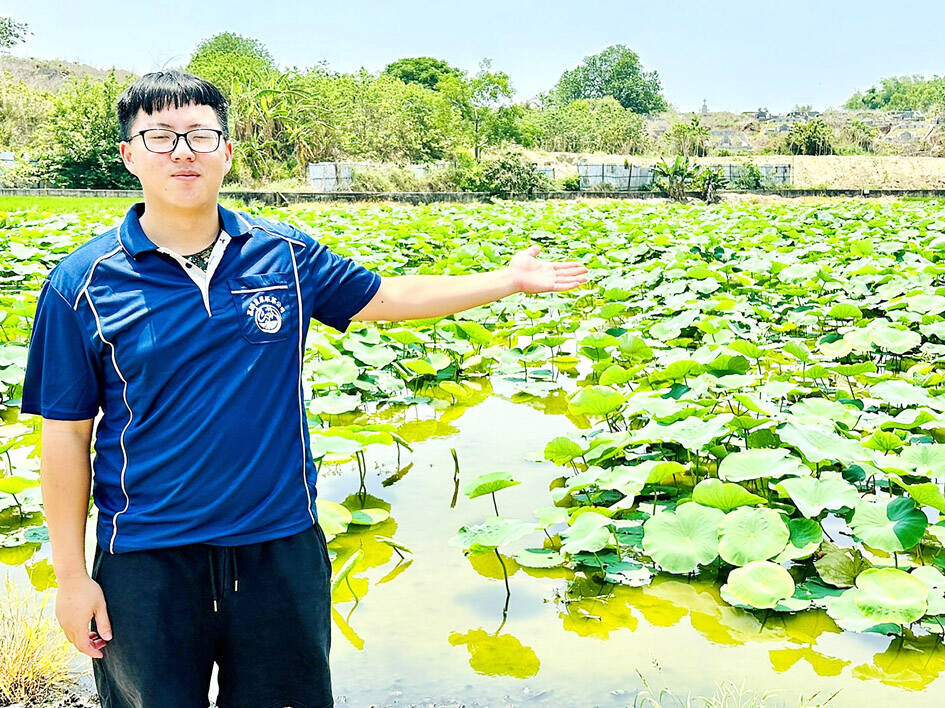A documentary about lotus farmers in Chiayi County has inspired a new generation to take root in the industry.
“Who would have imagined that this twilight industry not only did not disappear, but is now flourishing,” director Lai Li-chun (賴麗君) said of finding that her hometown’s staple crop is making a comeback thanks to her film.
Niutoushan (牛斗山) in Chiayi’s Minsyong Township (民雄) was once Taiwan’s largest producer of lotus roots, a favorite among Japanese consumers.

Photo: Tsai Tsung-hsun, Taipei Times
Moved by seeing the gnarled hands of the elderly farmers in her village after decades of digging up the deep roots, Lai decided to shoot a documentary to learn more about their lives.
In collaboration with filmmaker Peng Chia-ju (彭家如), Lai spent more than four years putting together Eagle Hand (老鷹之手).
The film in May 2021 won three awards at the Cannes World Film Festival, which is unaffiliated with the Cannes Film Festival — for Best Documentary Feature, Best Female Director and Best Cinematography.
Lai said her original intention was to document a waning industry.
Yet in the years since she began filming, the amount of land under cultivation has expanded to 70 hectares from 40 hectares, Lai said.
There are also many young people coming in to learn the trade, even without coming from farming backgrounds, to start a new foundation for their families, she added.
Lai said she was even more surprised to learn that many are still teenagers.
Some are the children of migrant workers who came to the profession as the only way to start their own businesses, she said.
Lai said all of this has made her believe that lotus farming is not a twilight industry, but the greatest gift their ancestors could have given to the village, capable of granting younger generations a chance to settle roots.
Tsai Chia-hao (蔡家豪) and Lee Chia-chun (李嘉俊) are the two founders of Chia Sheng, an agricultural product and marketing firm that seeks to help other new lotus farmers like themselves.
The two 21-year-olds have recruited about a dozen others, with an average age of only 20.
With 10 hectares under cultivation, they have a goal of earning more than NT$1 million (US$32,525) per person in the hope of attracting more people to join the industry.
Harvesting lotus roots from the marshy ground where they grow 30cm to 40cm deep is exhausting, Tsai said.
Farmers must rely on their perseverance to continue, he said, adding that every dollar is hard earned.
Demand is high and supply is low for lotus roots in Taiwan, Lee said, adding that if the labor issue can be solved, it could transform from a declining into a niche industry.

Costa Rica sent a group of intelligence officials to Taiwan for a short-term training program, the first time the Central American country has done so since the countries ended official diplomatic relations in 2007, a Costa Rican media outlet reported last week. Five officials from the Costa Rican Directorate of Intelligence and Security last month spent 23 days in Taipei undergoing a series of training sessions focused on national security, La Nacion reported on Friday, quoting unnamed sources. The Costa Rican government has not confirmed the report. The Chinese embassy in Costa Rica protested the news, saying in a statement issued the same

Taiwan’s Liu Ming-i, right, who also goes by the name Ray Liu, poses with a Chinese Taipei flag after winning the gold medal in the men’s physique 170cm competition at the International Fitness and Bodybuilding Federation Asian Championship in Ajman, United Arab Emirates, yesterday.

A year-long renovation of Taipei’s Bangka Park (艋舺公園) began yesterday, as city workers fenced off the site and cleared out belongings left by homeless residents who had been living there. Despite protests from displaced residents, a city official defended the government’s relocation efforts, saying transitional housing has been offered. The renovation of the park in Taipei’s Wanhua District (萬華), near Longshan Temple (龍山寺), began at 9am yesterday, as about 20 homeless people packed their belongings and left after being asked to move by city personnel. Among them was a 90-year-old woman surnamed Wang (王), who last week said that she had no plans

TO BE APPEALED: The environment ministry said coal reduction goals had to be reached within two months, which was against the principle of legitimate expectation The Taipei High Administrative Court on Thursday ruled in favor of the Taichung Environmental Protection Bureau in its administrative litigation against the Ministry of Environment for the rescission of a NT$18 million fine (US$609,570) imposed by the bureau on the Taichung Power Plant in 2019 for alleged excess coal power generation. The bureau in November 2019 revised what it said was a “slip of the pen” in the text of the operating permit granted to the plant — which is run by Taiwan Power Co (Taipower) — in October 2017. The permit originally read: “reduce coal use by 40 percent from Jan.